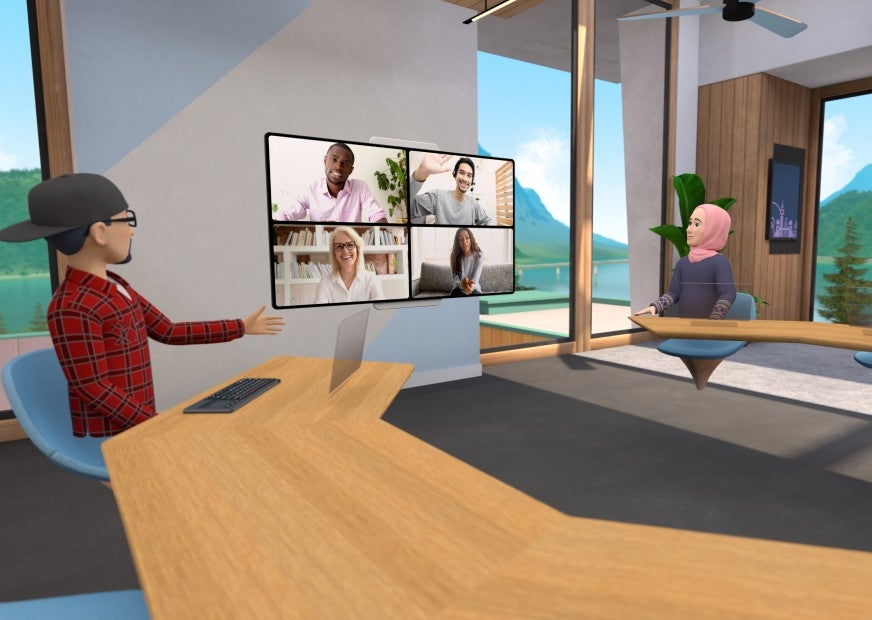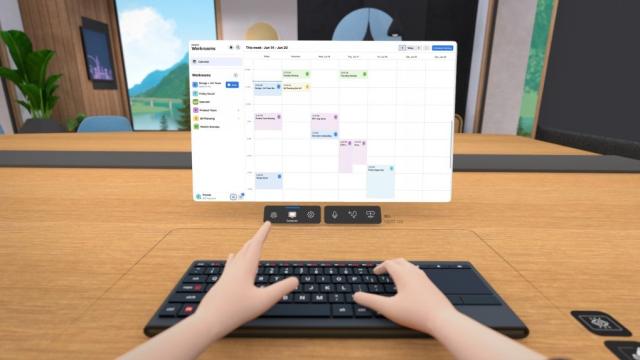While Facebook is still hard at work at making the metaverse happen, today Facebook is previewing its vision for the future of work with its Horizon Workrooms VR collaboration space.
Available today as a free beta on the Oculus Quest 2, Horizon Workrooms can simply be described as a virtual office space designed to better support workers regardless of where they’re located — at home, in the office, or anywhere else.
And while Facebook’s cartoony avatars might seem better suited in a children’s afternoon TV show, Facebook says Horizon Workrooms includes a number of features that make remote collaboration better and more productive than hosting a typical video call.
By using the Oculus Quest 2’s controllers, users can trace out a personal working space inside their virtual office, while the Oculus Remote Desktop companion app lets you create virtual representations of your physical computer and even your keyboard in VR, so as to give users a better sense of their surroundings along with full access to their notes and files.
Additionally, thanks to its support for low-latency spatial audio, anytime you’re in a workspace with others (like a virtual conference room), the Quest 2 can make other people sound as if they are in the same room as you are depending on how far away they are, letting you drift in and out of conversations just by moving around. And if you’re not happy with the way your avatar or virtual office look, Facebook says there’s a huge variety of customisation options to mess around with.
When it comes to being productive, Facebook also equips every virtual room with a virtual whiteboard, so people can sketch out ideas or diagrams while their colleagues follow along, with the whiteboards also supporting the ability to pin digital images from your files as needed. And when you’re done, you can even save all of your virtual whiteboards to revisit later or export them for traditional 2D viewing.
Also, thanks to built-in support for hand tracking, Workrooms users aren’t forced to employ the Quest 2’s controllers for everything while also enabling hand gestures for more natural communication. And for those who don’t have a VR headset, you can still participate in VR meetings in Horizon Workrooms using your webcam via a traditional invite link, with Facebook supporting up to 16 people in VR and up to a total of 50 people in a single call. And just like standard video meetings, you can still share files, take notes, and sync meetings with your Outlook or Google calendars.

Of course, with Facebook’s increased focus on supporting privacy and security, the company says that Workrooms will not use data from your virtual meetings to influence advertising and that your colleagues will be unable to view what’s on your virtual desktop unless you give them explicit permission. Finally, in the event that a person or even a whole team does something that violates Facebook’s community and VR conduct policies, users will be able to report people to a team admin or Facebook itself, with users able to include data/recordings from the incident for Facebook to review and handle accordingly.
So while Horizon Workrooms might seem a bit awkward or unnecessary right now (those avatars really don’t help), with more and more people looking to work remotely, the idea of improved VR collaboration tools does make a bit of sense.
Horizon Workrooms is available in beta form today as a free download, which you can sign up for here.
